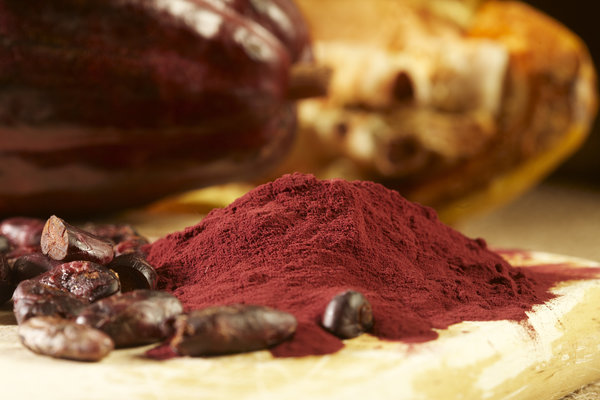(单词翻译:单击)
Science edged closer on Sunday to showing that an antioxidant in chocolate appears to improve some memory skills that people lose with age.
周日(指2014年10月26日)发布的科研成果进一步表明,巧克力中的一种抗氧化剂似乎可以帮助增进人们随着年龄增长而逐渐丧失的某些记忆技能。
In a small study in the journal Nature Neuroscience, healthy people, ages 50 to 69, who drank a mixture high in antioxidants called cocoa flavanols for three months performed better on a memory test than people who drank a low-flavanol mixture.
《自然神经科学》(Nature Neuroscience)杂志以年龄在50岁至69岁之间、身体健康的个人为对象进行了一项小规模研究。一些人连续3个月一直在喝可可黄烷醇含量较高的混合物——可可黄烷醇是抗氧化剂;另外一些人则在喝黄烷醇含量较低的混合物。在随后的记忆测试中,前者的表现好于后者。

On average, the improvement of high-flavanol drinkers meant they performed like people two to three decades younger on the study's memory task, said Dr. Scott A. Small, a neurologist at Columbia University Medical Center and the study's senior author. They performed about 25 percent better than the low-flavanol group.
研究报告的资深作者、哥伦比亚大学医疗中心(Columbia University Medical Center)的神经学家斯科特·A·斯莫尔(Scott A. Small)博士称,摄入高剂量黄烷醇者的记忆得到了改善,从记忆测试的成绩来看,这些人平均而言仿佛年轻了二三十岁。他们的分数比摄入低剂量黄烷醇者高25%。
从新鲜可可豆中提取的可可黄烷醇。
Mars, Incorporated
从新鲜可可豆中提取的可可黄烷醇。
"An exciting result," said Craig Stark, a neurobiologist at the University of California, Irvine, who was not involved in the research. "It's an initial study, and I sort of view this as the opening salvo."
“这一成果令人兴奋,”并未参与该研究的加利福尼亚大学欧文分校(University of California, Irvine)神经生物学家克雷格·斯塔克(Craig Stark)说,“它是一个初步的研究,在我看来这在某种程度上只是拉开序幕。”
He added, "And look, it's chocolate. Who's going to complain about chocolate?"
“而且你看,这可是巧克力。谁会对巧克力有意见呢?”他补充说。
The findings support recent research linking flavanols, especially epicatechin, to improved blood circulation, heart health and memory in mice, snails and humans. But experts said the new study, although involving only 37 participants and partly funded by Mars Inc., the chocolate company, goes further and was a well-controlled, randomized trial led by experienced researchers.
上述新发现印证了最近的一些研究。这些研究表明:黄烷醇——尤其是儿茶素——可以改善老鼠、蛇以及人类的血液循环、心脏健康和记忆力。不过有专家称,尽管这项新研究只有37个参与者,部分资金还是由巧克力生产商玛氏公司(Mars Inc.)提供的,但它更为深入,而且是一次由经验丰富的研究人员领导的、受到良好控制的随机试验。
Besides improvements on the memory test — a pattern recognition test involving the kind of skill used in remembering where you parked the car or recalling the face of someone you just met — researchers found increased function in an area of the brain's hippocampus called the dentate gyrus, which has been linked to this type of memory.
研究人员发现,除了在记忆测试中有所进步——那是一种模式识别测试,牵涉到回忆你在哪里停的车或者你刚刚遇见的某人的面孔时所使用的某种技能——服用高剂量黄烷醇者脑部海马区齿状回的功能也得到了加强。人们认为齿状回是与这类记忆相关联的。
"Boy, this is really interesting to see it in three months," said Dr. Steven DeKosky, a neurologist and visiting professor at the University of Pittsburgh. “They got this really remarkable increase in a place in the brain that we know is related to age-related memory change.”
“哇噢!3个月后再去观察它可真有趣,”神经学家、匹兹堡大学(University of Pittsburgh)访问教授史蒂芬·迪克斯基(Steven DeKosky)博士说,“他们大脑中的这个部位得到了显著增长。我们知道,它与关乎年龄的记忆力变化存在着关联。”
There was no increased activity in another hippocampal region, the entorhinal cortex, which is impaired early in Alzheimer's disease. That reinforces the idea that age-related memory decline is different and suggests that flavanols might not help Alzheimer's, even though they might delay normal memory loss.
但海马区内嗅皮质的活跃度并未增强——该部位会在阿尔茨海默氏病早期受损。由此强化了这样一种观念:与年龄有关的记忆力下降是另外一码事;同时表明,尽管黄烷醇或许可以延缓正常的记忆力衰退,但对阿尔茨海默氏病患者而言可能并不管用。
But unless you are stocking up for Halloween, do not rush to buy Milky Way or Snickers bars. To consume the high-flavanol group's daily dose of epicatechin, 138 milligrams, would take eating at least 300 grams of dark chocolate a day — about seven average-sized bars. Or possibly about 100 grams of baking chocolate or unsweetened cocoa powder, but concentrations vary widely depending on the processing. Milk chocolate has most epicatechin processed out of it.
不过,除非你在为万圣节囤货,否则可别急于购买银河系牛奶巧克力(Milky Way)或士力架(Snickers)巧克力棒。要达到高剂量黄烷醇那组的人每天138毫克的儿茶素摄入量,一天至少得吃300克黑巧克力——约合7根中等大小的巧克力棒。或者去吃掉100克烘培巧克力或不加糖的可可粉,但儿茶素的含量因加工流程的不同而存在极大的差异。牛奶巧克力里的大部分儿茶素都会在加工过程中流失。
"You would have to eat a large amount of chocolate," along with its fat and calories, said Hagen Schroeter, director of fundamental health and nutrition research for Mars, which funds many flavanol studies and approached Dr. Small for this one. ("I nearly threw them out," said Dr. Small, who added that he later concluded that the company employed serious scientists who would not bias the research.) Mars financed about half the study; other funders were the National Institutes of Health and two research foundations.
“你将不得不吞下大量巧克力”,包括其中的脂肪和卡路里——玛氏公司基础保健与营养研究主任哈根·施罗特(Hagen Schroeter)说道。玛氏资助过多项与黄烷醇有关的研究,并就这项新研究接触过斯莫尔博士。(斯莫尔博士说,“我差不多是把他们轰了出去”,接着又补充道,他后来得出结论,这家公司雇佣了一些严肃认真的科学家,不会令研究带有倾向性。)玛氏为这项研究提供了一半资金,其他资助者为美国国立卫生研究院(National Institutes of Health)和两家研究基金会。
"Candy bars don't even have a lot of chocolate in them," Dr. Schroeter said. And "most chocolate uses a process called batching and alkalization. That's like poison for flavanol."
“糖棒里甚至不会含有太多巧克力,”施罗特博士说。而且“大部分巧克力的生产都要经过配制和碱化这道工序。”这相当于把黄烷醇关进监狱。
Mars already sells a supplement, CocoaVia, which it says promotes healthy circulation, including for the heart and brain. It contains 20 to 25 milligrams of epicatechin per capsule or packet of powder, Dr. Schroeter said; 30 packets cost $34.95. Epicatechin is also in foods like tea and apples, although may be less absorbable.
玛氏已经推出了一款名为可维亚(CocoaVia)的补品。该公司称,可维亚能够促进循环系统的畅通,包括心脏循环和脑循环系统。施罗特说,每粒可维亚胶囊或每包可维亚粉含有20克至25克儿茶素;每30包34.96美元。茶、苹果等食品里也含有表儿茶素,但不太易于吸收。
The Columbia study had important limitations. For example, the only daily dietary requirements were either 900 milligrams of flavanols with 138 milligrams of epicatechin or 10 milligrams of flavanols with less than two milligrams of epicatechin, so participants could have eaten other things that played a role.
哥伦比亚大学医疗中心的研究有一些重要的局限性。例如,对日常饮食的唯一要求是,要么服用900毫克黄烷醇(含138毫克儿茶素),要么服用10毫克黄烷醇(含不到2毫克儿茶素),因此参与者可能吃了其他一些对实验结果有影响的东西。
And while researchers also had half of the healthy but sedentary participants in each group exercise four days a week, surprisingly, the exercise had no memory or brain effects.
此外,研究人员从每个组里身体健康但不爱活动的参与者中挑出一半,让他们每周运动4天。但奇怪的是,竟然没发现锻炼对记忆和大脑有影响。
Dr. Small, whose research previously found that exercise helped hippocampal function in younger people, suggested maybe more vigorous exercise is needed to affect older brains.
斯莫尔博士以前开展过的研究表明,运动能够增强年轻人海马体的功能。在他看来,也许运动量更大一点,才能对老年人的大脑产生影响。
"It's a very clever, interesting study, but there are some caveats," said Dr. Kenneth S. Kosik, a neuroscientist at the University of California, Santa Barbara. "People are going to say, ‘It looks like I can have a lot of candy bars and not exercise.' So it needs replication on a much larger scale."
“这是一项非常精巧、有趣的研究,但有些问题需要注意,”加州大学圣巴巴拉分校(University of California, Santa Barbara)的神经科学家肯尼斯·S·科西克(Kenneth S. Kosik)说,“人们会说,‘看起来我可以大嚼糖棒,还不用运动了。'因此有必要进行更大规模的复制性研究。”
More extensive research is planned. As for why flavanols would help memory, one theory is that they improve brain blood flow; another, favored by Dr. Small, is that they cause dendrites, message-receiving branches of neurons, to grow.
更多更广泛的研究正在计划之中。至于黄烷醇为什么可以帮助提高记忆力,一种理论是说它们能够促进脑部的血液流动,另一种是说它们能够促进树突,也就是神经元信息接收分支的生长。斯莫尔博士支持后者。
"Everybody's cautious about antioxidants, but this is a horse of a different color, a really elegant study," Dr. DeKosky said.
“每个人都对抗氧化剂谨慎以待,但这是另外一回事,是一项非常好的研究,”迪克斯基博士说。
Asked if he would eat more chocolate, he said, "Yeah, but the bar for me to do that is darn low."
当被问及他是否会吃更多巧克力时,他说,“会的,但这对我来说是太低的要求了。”


